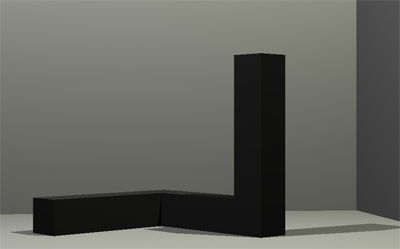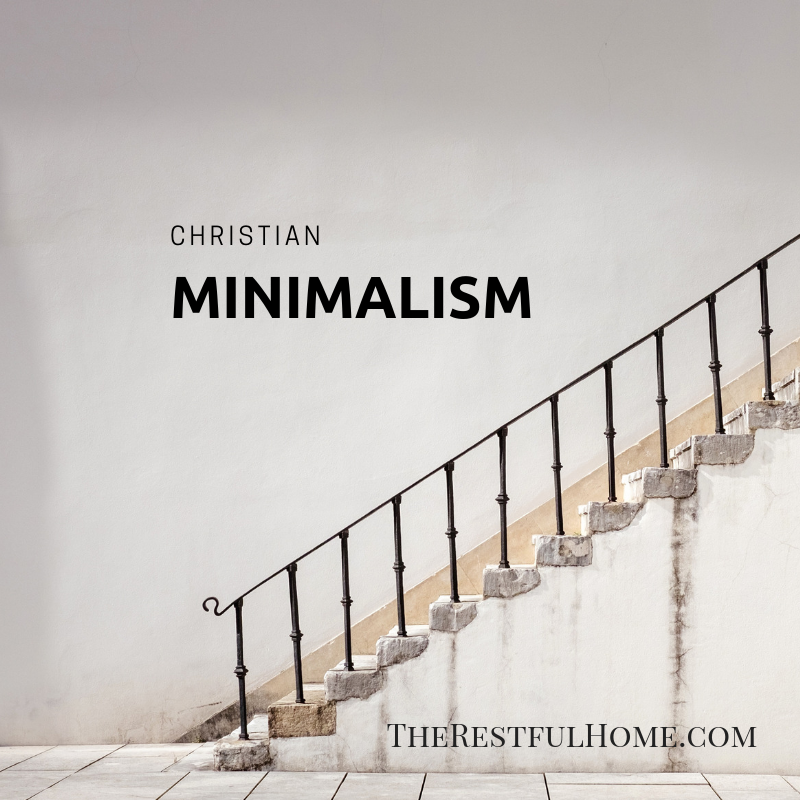Until about 2 years ago, I thought the word “minimalism” referred to an artistic movement. Minimalism IS an artistic movement, producing artwork that tries to say the most possible with the fewest “words.” For example, see the photo below of Tony Smith’s sculpture Free Ride. I’ll admit, I preferred Impressionism and Realism to Minimalism. And in art, I don’t think Christian minimalism even exists as a subgenre.

Photo from Wikipedia Commons.
My definition of the word minimalism changed, though, when some friends started talking about becoming minimalists. I started researching, and realized that “Minimalist” was just the new buzzword for the way of life my mom always had to maintain with six kids and fairly frequent moves: it’s called throwing everything away.
Clearing the clutter to destress is not a new idea for us, folks. We all know (and probably live with) the two classes of people: keepers and throwers. Keepers aren’t necessarily more sentimental than throwers. They’ve just learned to attach memories and emotions to things.
Often, those who become minimalists have discovered a key truth: things cannot make you happy.
The American dream is a lie. You will not find joy when you finally get your house with the two-car garage, your two children (boy and girl), your Cadillac, and your six-figure salary. Those things cannot provide any kind of joy.
Unfortunately, though, as people have discovered the joy of living with less, they’re still left with a void. They’ve already discovered that materialism can’t fill that void. So, many are turning to Buddhist practices, such as meditation, in an effort to change their mindsets. (For example, check out the later part of The Minimalist’s documentary, available on Netflix or Amazon.) Consumerism, they’ve found, is an empty religion. So they’ll try New Age or Buddhist principles.
So, is there such a thing as Christian minimalism? Can you reconcile Christianity with a modern lifestyle that has currently aligned itself with Buddhism?
My Answer: Yes
Christian minimalism far predates the modern minimalist movement. Jesus gave one of the clearest instructions for us to value our eternal future far above our possessions in Luke 12:15.
Then he said to them, “Watch out! Be on your guard against all kinds of greed; life does not consist in an abundance of possessions.” (NIV)
In the following verses (12:16-21), Jesus tells a story about a rich man.
“The ground of a certain rich man yielded an abundant harvest. He thought to himself, ‘What shall I do? I have no place to store my crops.’
“Then he said, ‘This is what I’ll do. I will tear down my barns and build bigger ones, and there I will store my surplus grain. And I’ll say to myself, “You have plenty of grain laid up for many years. Take life easy; eat, drink and be merry.”’
“But God said to him, ‘You fool! This very night your life will be demanded from you. Then who will get what you have prepared for yourself?’
“This is how it will be with whoever stores up things for themselves but is not rich toward God.”
So What Does Christian Minimalism Look Like?
Put simply, minimalism means reducing the number of your possessions to things you truly need or love. I’ve been inspired recently to thin down the clothes in my closet to ones I’ve worn within the last year, to sell furniture that we rarely use, to give away extra dishes and appliances to those in need. Our house feels more breathable. I feel less stressed. Unexpected guests aren’t frightening. And I find myself more content with what I already have instead of always looking for more and better THINGS. Contentment, friends, is a profoundly Christian concept. Giving away what you have that you don’t need is also a Christian concept. (Or even giving beyond what you can easily afford: think of the Macedonian churches Paul speaks about whose poverty overflowed in generosity. II Cor. 8.) Christian minimalism simply looks like following Christ instead of following our consumerist society.

Photo by Kara Eads.
What if You Live With a Keeper?
I’m a former keeper-turned-thrower after many moves. My husband is more of a collector-keeper. We have to learn to live together. But because of our shared faith, we both place more importance on people than things. We desire to spend more on God’s kingdom than our own earthly domains. Are we becoming “Christian minimalists”?
Not really. We are just Christians. Christ-followers who want to be rich toward God rather than storing up the maximum for ourselves.
How about you?
Are you a keeper? A thrower? Do you consider yourself a minimalist? How does that change your home and lifestyle? Let us know in the comments or by messaging us! (A link to my Instagram account: anna.therestfulhome.)



 : a favorite place to walk when we can!
Once
: a favorite place to walk when we can!
Once 
![The first photos are of my parents’ sprawling rural Arkansas garden. The last is of my tiny little beds in the big city. Plants bring life to even the smallest corner!
I’ve been reading some beautiful fiction this year, and I just posted a review of a book by one of my favorite authors, Leif Enger. (https://therestfulhome.com/brave-young-handsome-review/ in your browser, or click on the link in my Instagram profile) If you don’t have time to read the book, though, here’s just a quote or two for your enjoyment:
🎼
“Death arrived easy as the train; [he] just climbed aboard, like the capable traveler he was.”
🛤️
On riding a horse: “You are a feeble and tenuous being; the only thing a horse wants from you is your absence.” 🐎 😄
#quotes #leifenger #amreading #gardens #gardening](https://scontent-atl3-1.cdninstagram.com/v/t39.30808-6/468657020_18342474787176025_4442629541396867851_n.jpg?_nc_cat=108&ccb=1-7&_nc_sid=18de74&_nc_ohc=DEja6UP2ct4Q7kNvgEYJxCM&_nc_zt=23&_nc_ht=scontent-atl3-1.cdninstagram.com&edm=ANo9K5cEAAAA&_nc_gid=AA4bBsvQ_JpqZXLUPUTpTC8&oh=00_AYCjI9LUx-cJxe6cu0n7H1Gounaz92aBlTrQacnKut8umg&oe=67567CAB)

















[…] with our kids is more valuable than more stuff in our kids’ room. (If your kids are like my little man, they like the empty boxes best, […]